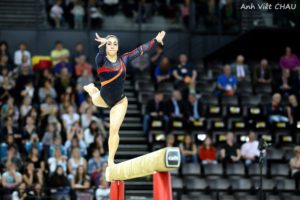Mirror-Spectator Staff
WATERTOWN — Armenian women in the Soviet Union were trained as professional gymnasts, but after the independence of the Republic of Armenia, only male gymnasts prepared for the Olympics. Now there is an Armenian American, Houry Gebeshian, who is very close to qualifying as the first Armenian female gymnast for the upcoming summer Olympics in Rio de Janeiro, Brazil. She has had to overcome obstacles to do so, but her desire to serve as a positive role model for young Armenian women has given her extra willpower.
Gebeshian was born in Auburndale, Mass. in 1989, but obtained Armenian citizenship in 2010 to be eligible to compete in Armenia’s name. She lives in Cleveland, Ohio but was visiting the Boston area recently to participate in the Starlight Invitational competition at the Massachusetts Institute of Technology, sponsored by her old hometown gym.
Gebeshian said she has self-funded almost all of her training expenses until now through her fulltime job as a physician’s assistant in the labor and delivery floor at the Cleveland Clinic. Consequently, she cannot devote as much time as she would like to preparation. She said, “I only practice 16 to 20 hours a week, compared to other Olympians who do 30 to 40 hours a week.”
She also does not have access to the coaches and special gyms that others have. Instead, she said, “I coach myself. I am in the gym every single day. I create all of my training plans, and diet plans and conditioning plans. I create 6 months of routines and then follow it.”








